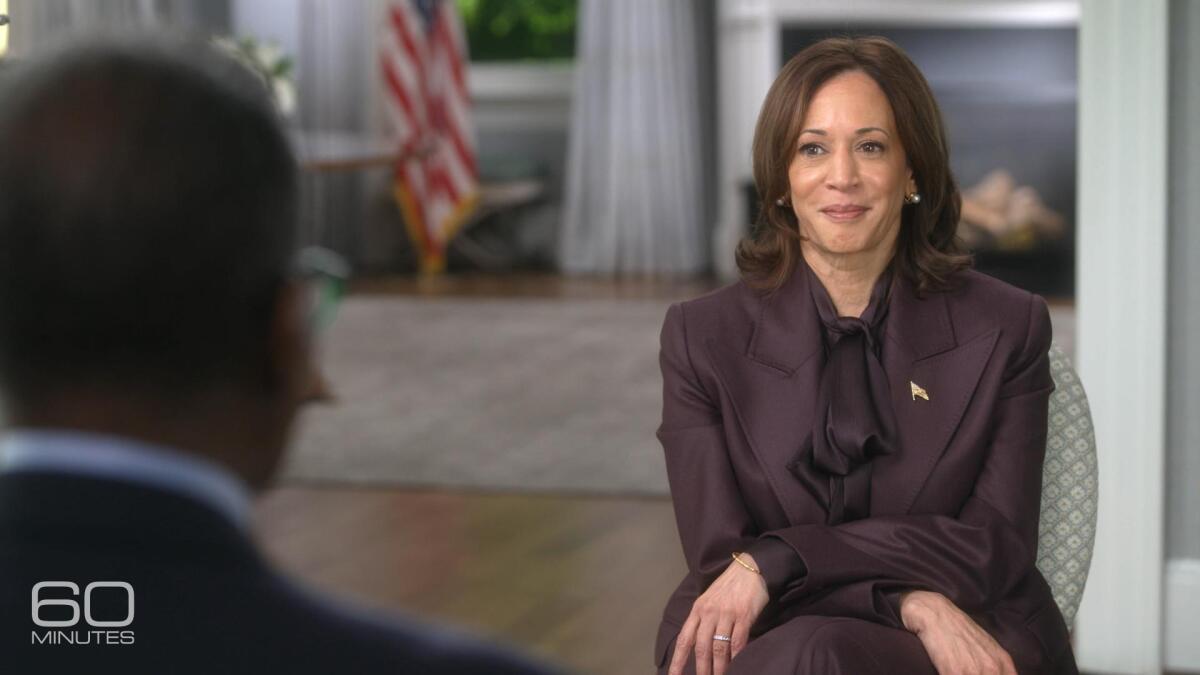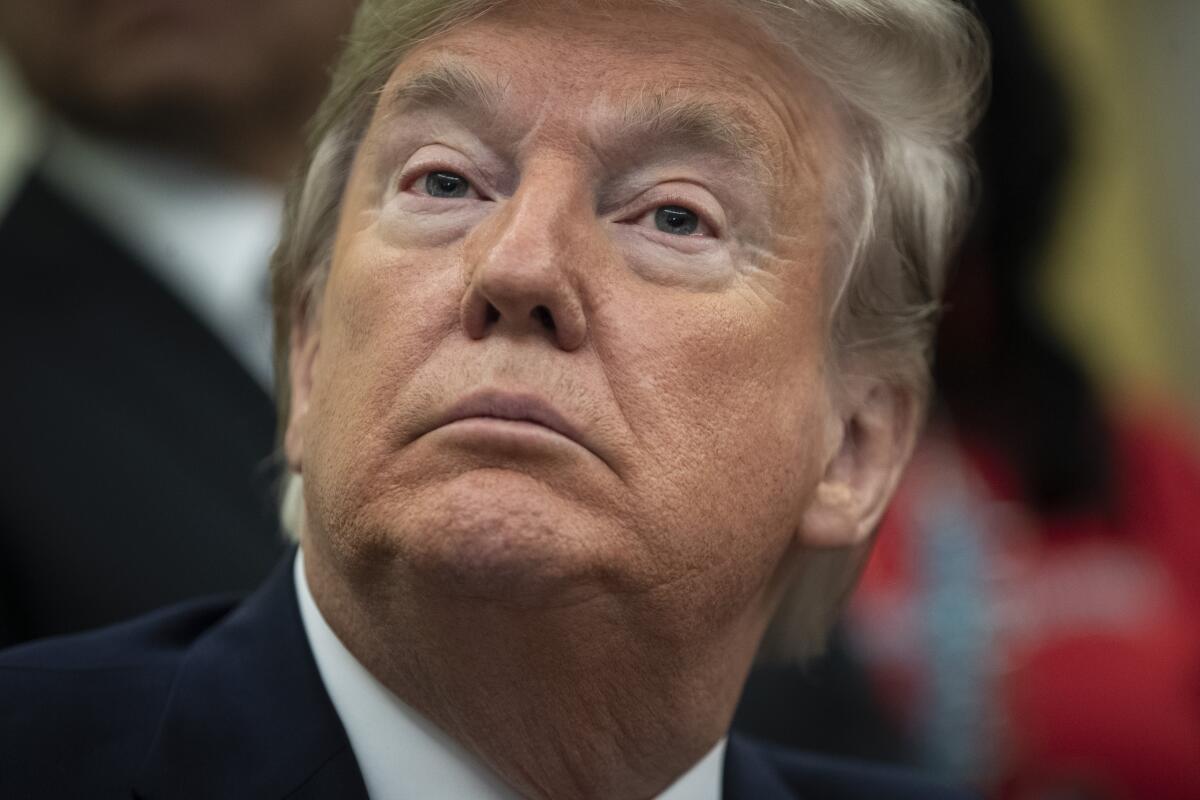How Paramount’s $16-million Trump settlement came together
By early spring, Paramount Global was in crisis. President Trump wouldn’t budge from his demand for an eye-popping sum of money and an apology from the company to settle his lawsuit over a CBS News “60 Minutes” interview with Kamala Harris. Journalists at the storied broadcaster were in revolt against the parent company.
Meanwhile, Paramount’s board faced withering pressure, with a settlement widely seen as a prerequisite for getting government approval for the company’s $8-billion sale to David Ellison’s Skydance Media, or the deal would collapse.
Then a new emergency erupted.
On May 4, CBS aired a hard-hitting “60 Minutes” segment that took aim at Trump’s targeting of law firms. Correspondent Scott Pelley anchored the report, which relied heavily on an interview with a leading Trump irritant — former top Hillary Clinton advisor Marc Elias.
Trump was furious. He threatened Paramount with an additional lawsuit alleging defamation, according to people close to the situation who were not authorized to comment.
The behind-the-scenes drama eventually would culminate with Paramount agreeing to pay $16 million to end the president’s battle over edits to October’s Harris interview, which Trump alleged was manipulated to boost the then-vice president’s election chances. Trump’s suit had demanded $20 billion in damages.
The deal resulted from months of back-and-forth among a constellation of power players with competing interests: the president, mogul Shari Redstone, tech billionaire Larry Ellison and his son David, Hollywood super agent Ari Emanuel, CBS News’ ousted leader Wendy McMahon and Jeff Shell, a former NBCUniversal chief now with RedBird Capital Partners, which backs Ellison’s Skydance.
The settlement, which the president approved late Tuesday, included a commitment by Trump to drop his claims and not sue over the May “60 Minutes” broadcast, according to sources and a Paramount statement.
Paramount said it agreed to pay Trump’s legal fees. The remainder of the $16-million settlement will go toward his future presidential library.
But the beleaguered company behind “Mission: Impossible” and “Yellowstone” mustered victories, withstanding the Trump team’s earlier demand for a $100-million payout, the knowledgeable sources said.
The company also refused to apologize for CBS’ reporting or edits, a stance to protect its journalistic ethics and 1st Amendment rights.
“This settlement allows Paramount to focus on its prospective sale, and CBS can maintain its principles,” said C. Kerry Fields, a business law professor at the USC Marshall School. “But principle has its price, and there certainly was one set here.”
The eight-month skirmish with Trump shined a harsh light on Paramount’s vulnerabilities — and deep divisions within the company and its prospective new owners.
Paramount had a narrow window to reach a truce. The company wanted to finalize the settlement before Wednesday, when Paramount held its annual shareholder meeting and three new members joined the board.
“This [settlement] was all about survival — it was that dark,” Fields said. “Paramount has to execute the sale to Skydance in order to survive.”
At first, Paramount’s sale to the Ellison family seemed like a sure bet. Larry Ellison, co-founder of Oracle Corp., is close to Trump and is also a possible buyer for TikTok, another deal of interest to the president. The landmark Paramount-Skydance deal, struck a year ago, could reshape one of Hollywood’s original studios and the entertainment landscape.
Redstone and her family agreed to part with their entertainment holdings, National Amusements Inc., and controlling Paramount shares. The family’s shaky finances were a catalyst for the sale. Redstone has borrowed heavily to meet debt obligations, including a $186-million term loan from Larry Ellison last year. The family is waiting for the cash from the sale of Paramount and National Amusements to the Ellisons and RedBird, a private equity firm.
But an unexpected blunder altered the deal’s course.
Last fall, “60 Minutes” invited Trump and Harris to participate in preelection interviews. Trump agreed, then backed out. CBS News went forward with a Harris sit-down.
Former Vice President Kamala Harris talks to “60 Minutes” correspondent Bill Whitaker.
(CBS News)
Correspondent Bill Whitaker asked Harris about the Biden administration’s rocky relations with Israel’s prime minister. Producers used different portions of her answer on two programs: a convoluted response on CBS’ Sunday morning show “Face the Nation,” and a more succinct part on “60 Minutes.”
Trump and his supporters zeroed in on the discrepancy. They accused CBS of doctoring the interview. CBS News denied the allegation, saying the edits were routine.
Days before the election, Trump sued in Amarillo, Texas, ensuring the case would be overseen by a Trump-appointed judge.
His lawsuit alleged the “60 Minutes” edits amounted to election interference — “malicious, deceptive, and substantial news distortion calculated to confuse, deceive, and mislead the public,” in the suit’s words.
President Donald Trump in the Oval Office.
(Bloomberg)
1st Amendment experts said the case had no merit; some figured it was a campaign stunt.
Days later, Shell, the RedBird executive who will become Paramount’s president should Skydance take over, held a conference call with top CBS executives. Shell suggested “60 Minutes” release the full Harris interview transcript in a bid for transparency, according to people familiar with the matter.
News executives refused, drawing a clear division between some high-level Paramount executives and Ellison’s team.
Those Paramount executives have bristled over Shell’s involvement, including a comment he reportedly made to McMahon late last year, stating the company eventually would have to settle. Skydance has said it has an agreement with Paramount that gives Ellison and Shell the ability to give input on key business issues — even before acquiring Paramount.
A spokesperson for Shell declined to comment.
The role of Shell, ousted from his previous role running NBCUniversal after acknowledging an inappropriate relationship with an underling, has been controversial. Representatives for the creators of “South Park” have accused him of overstepping his authority and meddling with a protracted negotiation over their overall deal and streaming rights to the long-running cartoon. A representative for Shell denied that accusation.
Trump had scored previous victories over media organizations. In December, the Walt Disney Co. agreed to pay him $16 million, including $1 million for his attorney fees, to end a dispute stemming from ABC anchor George Stephanopoulos’ inaccurate description of Trump’s liability in a civil court case. Press advocates howled.
Paramount held firm. But it failed to get Trump’s case dismissed or moved to a court in New York, where CBS and “60 Minutes” are based.
So the company was in a box. Its sale to Skydance requires the approval of the Federal Communications Commission to transfer CBS TV station licenses to the Ellisons, and that consent has been elusive.
In one of his first moves as FCC chairman, Trump appointee Brendan Carr launched an inquiry into whether CBS’ edits of the Harris interview rose to the level of news distortion — the crux of Trump’s lawsuit.
In February, Carr demanded CBS release a raw transcript of the Harris interview and the unedited footage. CBS complied; the material showed Harris had been accurately quoted.
The Texas judge ordered Paramount and Trump’s lawyers into mediation. Talks began April 30.
That weekend, “60 Minutes” ran its report on Trump and the law firms, riling Redstone and others. The Trump team and Paramount were already far apart, the sources said.
Soon, CBS News and Stations President Wendy McMahon was forced out. Knowledgeable sources attributed her departure to months of strife and persistent criticism from Redstone, who serves as Paramount’s chair. McMahon also made missteps, including overseeing an unsuccessful reboot of “CBS Evening News.”
Her exit followed that of Bill Owens, the longtime executive producer of “60 Minutes,” who fought efforts to settle.
The day McMahon was ousted, left-leaning U.S. Sens. Elizabeth Warren (D-Mass.), Bernie Sanders (I-Vt.) and Ron Wyden (D-Ore.) lobbed a salvo at Redstone. In a May 19 letter, they warned that Paramount board members risked possible bribery charges if they paid Trump to settle the lawsuit as a way to win FCC approval for the Skydance deal.
By early June, Redstone and the Ellison team were getting restless.
Emanuel, the agent, stepped in to help get the dealmaking back on track, people familiar with the matter said. Emanuel is Trump’s former talent agent and one of Ellison’s closest allies.
On June 7, Ellison met briefly with Trump at a UFC event in New Jersey. Emanuel is executive chairman of the WME Group and chief executive of UFC’s parent company, TKO.
According to a source, Emanuel associate Dana White, the Trump-supporting UFC chief executive, helped facilitate the Ellison meeting with the president, which occurred steps away from the fighters’ octagon.
People close to Ellison and Emanuel declined to discuss Ellison’s interactions with the president. Representatives of Skydance, Redstone and Emanuel declined to comment for this story.
Finally, a breakthrough came when Trump offered support for Ellison and the Skydance deal, though he continued to blast Harris and CBS News.
“Ellison is great,” Trump said from the White House lawn on June 18. “He’ll do a great job with it.”
Meanwhile, the clock was ticking. Redstone and others wanted the board to handle the settlement before the shareholder meeting, when one director stepped down, and three new members joined the board.
Redstone recused herself from voting but made her wishes known.
The settlement was finally reached about 10 hours before the Paramount board switched.
One person close to the legal effort said the agreement “got over the finish line” due to a sweetener for Trump. His team anticipates that Paramount networks eventually will run millions of dollars worth of free commercials, or public service announcements, in support of Trump causes, including combating antisemitism and increasing border security.
Paramount denied this.
“Paramount’s settlement with President Trump does not include PSAs,” the company said in a statement. “Paramount has no knowledge of any promises or commitments made to President Trump other than those set forth in the settlement proposed by the mediator and accepted by the parties.”
Skydance declined to comment. Emanuel did not respond to messages.
The settlement does contain another provision championed by Trump.“60 Minutes” will release transcripts of interviews with eligible U.S. presidential candidates after those interviews air, “subject to redactions as required for legal or national security concerns,” Paramount said.
1st Amendment advocates were discouraged by the deal. So were Trump’s enemies, including the senators who had vowed to investigate the deal for bribery.
Paramount’s move to “settle a bogus lawsuit with President Trump over a 60 Minutes report he did not like is an extremely dangerous precedent,” Sanders, the U.S. senator, said in a statement. “Paramount’s decision will only embolden Trump to continue attacking, suing and intimidating the media.”

